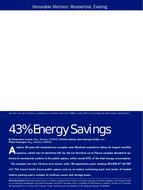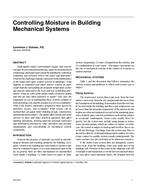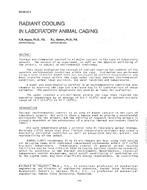An analytical model was developed for the lithium bromide-water (LibR-H2O) vertical-tube absorber by Patnaik et al. (1993). Model output has been compared to experimental data from two different sources for the smooth tube – Jianpin et al. (1985) and Miller et al. (1992). The data gathered by the latter also includes advanced absorber surfaces – pin-finned (three), grooved, fluted and twisted tubes. The experimental comparisons were performed by running the model at the same operating conditions as those during which the experimental data were collected. The performances of all seven advanced tubes were predicted adequately (within + or – 20% overall) within the experimental ranges covered by the tests carried out by Miller. Finally, the model was used to generate design charts for each type of absorber tube. Examples of the charts are presented with guidelines for their use in the design of prototypes.
KEYWORDS: calculating, designing, vertical, tubes, absorbers, lithium bromide, water, comparing, experiment, performance, extended surfaces heat exchangers, smooth tube heat exchangers, finned tube heat exchangers, heat exchangers, heat load, heat transfer coefficient, prototypes
Citation: ASHRAE Trans. 1994, Vol.100, Part 2, Paper number 3801, 185-196, 18 figs., 2 tabs., refs.
Product Details
- Published:
- 1994
- File Size:
- 1 file , 1.2 MB
- Product Code(s):
- D-17389


